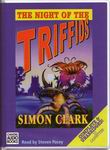
 The Night Of The Triffids
The Night Of The Triffids
By Simon Clark; Read by Stephen Pacey
10 Cassettes – 12 Hours 30 Minutes [UNABRIDGED]
Publisher: Chivers Audio
Published: 2002
ISBN: 0754007669
Themes: / Science Fiction / Disaster / Society /
I was twelve years old when I discovered John Wyndham’s awe-inspiring The Day of the Triffids. For me, standing between the world of childhood and the mysterious new world of adulthood, it was a revelation [it] wasn’t merely a good story; it was such a powerful transforming experience that the hero’s struggle for survival has stayed with me ever since.”
-Author Simon Clark
Chock full of adventure, action, politics, revolution, and romance, The Night Of The Triffids is horror author Simon Clark’s sequel to the venerable 1951 John Wyndham novel The Day Of The Triffids. Wyndam’s story was about a confluence of two natural disasters – the appearance of some strange green lights in the sky that blinded anyone who looked at them and the subsequent rampage of a carnivorous walking plant called a Triffid – which was previously only a curiosity. The narrator of that tale was Bill Masen, a man who by pure chance managed to avoid becoming blinded like 99% of humanity. At the end of The Day Of The Triffids, the hero, Bill Masen and his wife and four-year-old son David leave the British mainland to join a new colony on the Isle of Wight. In a way that story was a kind of retelling of The War Of The Worlds, excepting that the aliens weren’t from Mars. That novel was a powerful disaster tale heavily influenced by the cold war era in which it was set. Simon Clark’s sequel takes place twenty-five years. It is told by David Masen, Bill Masen’s now grown-up son, who is an aviator in the fledgling Isle of Wight Airforce. The Masen family, along with a handful of other British survivors, have started rebuilding society on that Island off the south of Britain. But when a new disaster strikes humanity in its weakened state may not survive.
There are very few genuine science fiction elements in this book, the closest being the soft science fiction idea of adopting new values for new situations. As an example, the few remaining people have decided to take a crash effort to increase the population – and in so doing have created something called “Mother Houses”. These are convent-like homes where fertile women give birth and infertile women raise babies – all in an effort to maximize the birth rate. I’m not sure if Clark knew it or not but frighteningly, the Nazis’, had something similar – the “Lebensborn,” which were mother houses, set up by Heinrich Himmler to care for unmarried pregnant women whose “racial” characteristics (blond hair, blue eyes) fit the Nazis’ Aryan ideal. “Racially pure” SS members were encouraged to visit often and sire many young children for the Fuhrer. Horrific as such a baby factory sounds in The Night Of The Triffids this is but one of the ‘necessary evils’ that society is experimenting with. The good news is that it all manages to replicate
much of the feel of The Day Of The Triffids, but where Clark really stumbles is with the plotting. The opening scene and the ensuing couple of chapters are very interesting, and made me wonder where it all was going. But that mystery was dropped until a throw away explanation in the final chapter. And as the Brits say that ‘just isn’t cricket’. The whole book has a stumbling along bumbling along plot that doesn’t allow you to guess where it might be going – perhaps this was in part due to what I would assume was to be its target audience – preteens and young teens – heck it may have even been a stylistic choice. I don’t know.
What I do know is that what success Night Of The Triffids does have is due in no small part to the first person perspective. English narrator Stephen Pacey does good work with the compassionate everyman David Masen, his other voices including variously accented Americans are good too, though they were fairly easy to tell that it was a ‘put-on’ accents. If you’re not expecting it to surpass much less equal the original The Night Of The Triffids will be acceptable entertainment.
Posted by Jesse Willis

 BBC 7’s The 7th Dimension has two ghoulishly good readings airing this week as well as a lengthy radio dramatized version of the most famous vampire story ever told:
BBC 7’s The 7th Dimension has two ghoulishly good readings airing this week as well as a lengthy radio dramatized version of the most famous vampire story ever told:
